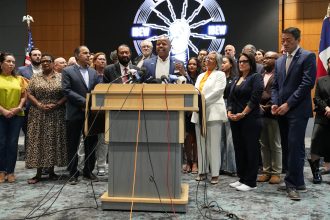By David Shepardson
WASHINGTON (Reuters) -U.S. Transportation Secretary Sean Duffy and Republican leaders in Congress on Thursday warned that flight disruptions may increase as a government shutdown enters its 23rd day and controllers miss their first full paycheck.
Some 13,000 air traffic controllers and about 50,000 Transportation Security Administration officers must work without pay during the government shutdown. Controllers will miss their first full paycheck on Tuesday.
“I can’t guarantee you that your flight will be on time. I can’t guarantee you that your flight’s not going to be canceled. It’s going to depend on our air traffic controllers coming into work every single day,” Duffy said at a Capitol Hill press conference, urging controllers to keep working.
Last week, air traffic control absences accounted for 53% of flight delays since the shutdown began, compared with 5% normally, he said.
House Speaker Mike Johnson said the Federal Aviation Administration does not have existing resources to pay air traffic controllers and called on Democrats to pass legislation to reopen the government.
The Senate is set to consider legislation on Thursday to pay essential workers during the shutdown.
Democrats want Republicans to approve new healthcare subsidies for people who buy insurance through the Affordable Care Act as a condition of reopening.
Air traffic control has become a flashpoint in the debate over the shutdown with both parties blaming the other. Unions and airlines have urged a quick end to the standoff.
“Football fans: if you are stuck in the airport this weekend while your favorite team is about to kickoff, you can blame the Democrats,” Johnson said.
In 2019, during a 35-day shutdown, the number of absences by controllers and TSA officers rose as workers missed paychecks, extending checkpoint wait times at some airports. Authorities were forced to slow air traffic in New York and Washington, which put pressure on lawmakers to end that standoff.
The FAA is about 3,500 air traffic controllers short of targeted staffing levels and many had been working mandatory overtime and six-day weeks even before the shutdown.
(Reporting by David Shepardson; Editing by Chizu Nomiyama and Bill Berkrot)









